- Home
- Junot Díaz
The Brief Wondrous Life of Oscar Wao Page 2
The Brief Wondrous Life of Oscar Wao Read online
Page 2
Mami, stop it, his sister cried, stop it! She threw him to the floor. Dale un galletazo, she panted, then see if the little puta respects you.
If he’d been a different nigger he might have considered the galletazo. It wasn’t just that he didn’t have no kind of father to show him the masculine ropes, he simply lacked all aggressive and martial tendencies. (Unlike his sister, who fought boys and packs of morena girls who hated her thin nose and straightish hair.) Oscar had like a zero combat rating; even Olga and her toothpick arms could have stomped him silly. Aggression and intimidation out of the question. So he thought it over. Didn’t take him long to decide. After all, Maritza was beautiful and Olga was not; Olga sometimes smelled like pee and Maritza did not. Maritza was allowed over their house and Olga was not. (A puertorican over here? his mother scoffed. Jamas!) His logic as close to the yes⁄no math of insects as a nigger could get. He broke up with Olga the following day on the playground, Maritza at his side, and how Olga had cried! Shaking like a rag in her hand-me-downs and in the shoes that were four sizes too big! Snots pouring out her nose and everything!
In later years, after he and Olga had both turned into overweight freaks, Oscar could not resist feeling the occasional flash of guilt when he saw Olga loping across a street or staring blankly out near the New York bus stop, couldn’t stop himself from wondering how much his cold-as-balls breakup had contributed to her present fucked-upness. (Breaking up with her, he would remember, hadn’t felt like anything; even when she started crying, he hadn’t been moved. He’d said, No be a baby.)
What had hurt, however, was when Maritza dumped him. Monday after he’d fed Olga to the dogs he arrived at the bus stop with his beloved Planet of the Apes lunch box only to discover beautiful Maritza holding hands with butt-ugly Nelson Pardo. Nelson Pardo who looked like Chaka from Land of the Lost! Nelson Pardo who was so stupid he thought the moon was a stain that God had forgotten to clean. (He’ll get to it soon, he assured his whole class.) Nelson Pardo who would become the neighborhood B&E expert before joining the Marines and losing eight toes in the First Gulf War. At first Oscar thought it a mistake; the sun was in his eyes, he’d not slept enough the night before. He stood next to them and admired his lunch box, how realistic and diabolical Dr. Zaius looked. But Maritza wouldn’t even smile at him! Pretended he wasn’t there. We should get married, she said to Nelson, and Nelson grinned moronically, turning up the street to look for the bus. Oscar had been too hurt to speak; he sat down on the curb and felt something overwhelming surge up from his chest, scared the shit out of him, and before he knew it he was crying; when his sister, Lola, walked over and asked him what was the matter he’d shaken his head. Look at the mariconcito, somebody snickered. Somebody else kicked his beloved lunch box and scratched it right across General Urko’s face. When he got on the bus, still crying, the driver, a famously reformed PCP addict, had said, Christ, don’t be a fucking baby.
How had the breakup affected Olga? What he really was asking was: How had the breakup affected Oscar?
It seemed to Oscar that from the moment Maritza dumped him—Shazam!—his life started going down the tubes. Over the next couple of years he grew fatter and fatter. Early adolescence hit him especially hard, scrambling his face into nothing you could call cute, splotching his skin with zits, making him self-conscious; and his interest—in Genres!—which nobody had said boo about before, suddenly became synonymous with being a loser with a capital L. Couldn’t make friends for the life of him, too dorky, too shy, and (if the kids from his neighborhood are to be believed) too weird (had a habit of using big words he had memorized only the day before). He no longer went anywhere near the girls because at best they ignored him, at worst they shrieked and called him gordo asqueroso! He forgot the perrito, forgot the pride he felt when the women in the family had called him hombre. Did not kiss another girl for a long long time. As though almost everything he had in the girl department had burned up that one fucking week.
Not that his ‘girlfriends’ fared much better. It seemed that whatever bad no-love karma hit Oscar hit them too. By seventh grade Olga had grown huge and scary, a troll gene in her somewhere, started drinking 151 straight out the bottle and was finally taken out of school because she had a habit of screaming NATAS! in the middle of homeroom. Even her breasts, when they finally emerged, were floppy and terrifying. Once on the bus Olga had called Oscar a cake eater, and he’d almost said, Look who’s talking, puerca, but he was afraid that she would rear back and trample him; his cool-index, already low, couldn’t have survived that kind of a paliza, would have put him on par with the handicapped kids and with Joe Locorotundo, who was famous for masturbating in public.
And the lovely Maritza Chacon? The hypotenuse of our triangle, how had she fared? Well, before you could say Oh Mighty Isis, Maritza blew up into the flyest guapa in Paterson, one of the Queens of New Peru. Since they stayed neighbors, Oscar saw her plenty, a ghetto Mary Jane, hair as black and lush as a thunderhead, probably the only Peruvian girl on the planet with pelo curlier than his sister’s (he hadn’t heard of Afro-Peruvians yet, or of a town called Chincha), body fine enough to make old men forget their infirmities, and from the sixth grade on dating men two, three times her age. (Maritza might not have been good at much—not sports, not school, not work—but she was good at men.) Did that mean she had avoided the curse—that she was happier than Oscar or Olga? That was doubtful. From what Oscar could see, Maritza was a girl who seemed to delight in getting slapped around by her boyfriends. Since it happened to her all the time. If a boy hit me, Lola said cockily, I would bite his face.
See Maritza: French-kissing on the front stoop of her house, getting in or out of some roughneck’s ride, being pushed down onto the sidewalk. Oscar would watch the French-kissing, the getting in and out, the pushing, all through his cheerless, sexless adolescence. What else could he do? His bedroom window looked out over the front of her house, and so he always peeped her while he was painting his D&D miniatures or reading the latest Stephen King. The only things that changed in those years were the models of the cars, the size of Maritza’s ass, and the kind of music volting out the cars’ speakers. First freestyle, then III Will-era hiphop, and, right at the very end, for just a little while, Hector Lavoe and the boys.
He said hi to her almost every day, all upbeat and faux-happy, and she said hi back, indifferently, but that was it. He didn’t imagine that she remembered their kissing—but of course he could not forget.
THE MORONIC INFERNO
High school was Don Bosco Tech, and since Don Bosco Tech was an urban all-boys Catholic school packed to the strakes with a couple hundred insecure hyperactive adolescents, it was, for a fat sci-fi-reading nerd like Oscar, a source of endless anguish. For Oscar, high school was the equivalent of a medieval spectacle, like being put in the stocks and forced to endure the peltings and outrages of a mob of deranged half-wits, an experience from which he supposed he should have emerged a better person, but that’s not really what happened—and if there were any lessons to be gleaned from the ordeal of those years he never quite figured out what they were. He walked into school every day like the fat lonely nerdy kid he was, and all he could think about was the day of his manumission, when he would at last be set free from its unending horror. Hey Oscar, are there faggots on Mars?—Hey, Kazoo, catch this. The first time he heard the term moronic inferno he knew exactly where it was located and who were its inhabitants.
Sophomore year Oscar found himself weighing in at a whopping 245 (260 when he was depressed, which was often) and it had become clear to everybody, especially his family, that he’d become the neighborhood parigiiayo.↓
≡ The pejorative parigiüayo, Watchers agree, is a corruption of the English neologism ‘party watcher’. The word came into common usage during the First American Occupation of the DR, which ran from 1916 to 1924. (You didn’t know we were occupied twice in the twentieth century? Don’t worry, when you have kids they won’t know the U.S. occupied Iraq ei
ther.) During the First Occupation it was reported that members of the American Occupying Forces would often attend Dominican parties but instead of joining in the fun the Outlanders would simply stand at the edge of dances and watch. Which of course must have seemed like the craziest thing in the world. Who goes to a party to watch? Thereafter, the Marines were parigüayos—a word that in contemporary usage describes anybody who stands outside and watches while other people scoop up the girls. The kid who don’t dance, who ain’t got game, who lets people clown him—he’s the parigüayo.
If you looked in the Dictionary of Dominican Things, the entry for parigüayo would include a wood carving of Oscar. It is a name that would haunt him for the rest of his life and that would lead him to another Watcher, the one who lamps on the Blue Side of the Moon.
Had none of the Higher Powers of your typical Dominican male, couldn’t have pulled a girl if his life depended on it. Couldn’t play sports for shit, or dominoes, was beyond uncoordinated, threw a ball like a girl. Had no knack for music or business or dance, no hustle, no rap, no G. And most damning of all: no looks. He wore his semi-kink hair in a Puerto Rican afro, rocked enormous Section 8 glasses—his ‘anti-pussy devices,’ Al and Miggs, his only friends, called them—sported an unappealing trace of mustache on his upper lip and possessed a pair of close-set eyes that made him look somewhat retarded. The Eyes of Mingus. (A comparison he made himself one day going through his mother’s record collection; she was the only old-school dominicana he knew who had dated a moreno until Oscar’s father put an end to that particular chapter of the All-African World Party.) You have the same eyes as your abuelo, his Nena Inca had told him on one of his visits to the DR, which should have been some comfort—who doesn’t like resembling an ancestor?—except this particular ancestor had ended his days in prison.
Oscar had always been a young nerd—the kind of kid who read Tom Swift, who loved comic books and watched Ultraman —by high school his commitment to the Genres had become absolute. Back when the rest of us were learning to play wallball and pitch quarters and drive our older brothers’ cars and sneak dead soldiers from under our parents’ eyes, he was gorging himself on a steady stream of Lovecraft, Wells, Burroughs, Howard, Alexander, Herbert, Asimov, Bova, and Heinlein, and even the Old Ones who were already beginning to fade—E. E. ‘Doc’ Smith, Stapledon, and the guy who wrote all the Doc Savage books—moving hungrily from book to book, author to author, age to age. (It was his good fortune that the libraries of Paterson were so under funded that they still kept a lot of the previous generation’s nerdery in circulation.) You couldn’t have torn him away from any movie or TV show or cartoon where there were monsters or spaceships or mutants or doomsday devices or destinies or magic or evil villains. In these pursuits alone Oscar showed the genius his grandmother insisted was part of the family patrimony. Could write in Elvish, could speak Chakobsa, could differentiate between a Slan, a Dorsai, and a Lensman in acute detail, knew more about the Marvel Universe than Stan Lee, and was a role-playing game fanatic. (If only he’d been good at videogames it would have been a slam dunk but despite owning an Atari and an Intellivision he didn’t have the reflexes for it.) Perhaps if like me he’d been able to hide his otakuness maybe shit would have been easier for him, but he couldn’t. Dude wore his nerdiness like a Jedi wore his light saber or a Lensman her lens. Couldn’t have passed for Normal if he’d wanted to.↓
≡ Where this outsized love of genre jumped off from no one quite seems to know. It might have been a consequence of being Antillean (who more sci-fi than us?) or of living in the DR for the first couple of years of his life and then abruptly wrenchingly relocating to New Jersey—a single green card shifting not only worlds (from Third to First) but centuries (from almost no TV or electricity to plenty of both). After a transition like that I’m guessing only the most extreme scenarios could have satisfied. Maybe it was that in the DR he had watched too much Spider-Man, been taken to too many Run Run Shaw kung fu movies, listened to too many of his abuela’s spooky stories about el Cuco and la Ciguapa? Maybe it was his first librarian in the U.S., who hooked him on reading, the electricity he felt when he touched that first Danny Dunn book? Maybe it was just the zeitgeist (were not the early seventies the dawn of the Nerd Age?) or the fact that for most of his childhood he had absolutely no friends? Or was it something deeper, something ancestral?
Who can say?
What is clear is that being a reader⁄fanboy (for lack of a better term) helped him get through the rough days of his youth, but it also made him stick out in the mean streets of Paterson even more than he already did. Victimized by the other boys punches and pushes and wedgies and broken glasses and brand-new books from Scholastic, at a cost of fifty cents each, tom in half before his very eyes. You like books? Now you got two! Har-har! No one, alas, more oppressive than the oppressed. Even his own mother found his preoccupations nutty. Go outside and play! she commanded at least once a day. Pórtate como un muchacho normal.
(Only his sister, a reader too, supporting him. Bringing him books from her own school, which had a better library.)
You really want to know what being an X-Man feels like? Just be a smart bookish boy of color in a contemporary U.S. ghetto. Mamma mia! Like having bat wings or a pair of tentacles growing out of your chest.
Pa’ ‘fuera! his mother roared. And out he would go, like a boy condemned, to spend a few hours being tormented by the other boys—Please, I want to stay, he would beg his mother, but she shoved him out—You ain’t a woman to be staying in the house—one hour, two, until finally he could slip back inside unnoticed, hiding himself in the upstairs closet, where he’d read by the slat of light that razored in from the cracked door. Eventually, his mother rooting him out again: What in carajo is the matter with you?
(And already on scraps of paper, in his composition books, on the backs of his hands, he was beginning to scribble, nothing serious for now, just rough facsimiles of his favorite stories, no sign yet that these half-assed pastiches were to be his Destiny.)
Oscar was a social introvert who trembled with fear during gym class and watched nerd British shows like Doctor Who and Blake’s 7, and could tell you the difference between a Veritech fighter and a Zentraedi walker, and he used a lot of huge sounding nerd words like indefatigable and ubiquitous when talking to niggers who would barely graduate from high school.
One of those nerds who was always hiding out in the library, who adored Tolkien and later the Margaret Weis and Tracy Hickman novels (his favorite character was of course Raistlin), and who, as the eighties marched on, developed a growing obsession with the End of the World. (No apocalyptic movie or book or game existed that he had not seen or read or played—Wyndham and Christopher and Gamma World were his absolute favorites.) You get the picture. His adolescent nerdliness vaporizing any iota of a chance he had for young love. Everybody else going through the terror and joy of their first crushes, their first dates, their first kisses while Oscar sat in the back of the class, behind his DM’s screen, and watched his adolescence stream by. Sucks to be left out of adolescence, sort of like getting locked in the closet on Venus when the sun appears for the first time in a hundred years. It would have been one thing if like some of the nerd boys I’d grown up with he hadn’t cared about girls, but alas he was still the passionate enamorao who fell in love easily and deeply. He had secret loves all over town, the kind of curly-haired big-bodied girls who wouldn’t have said boo to a loser like him but about whom he could not stop dreaming. His affection—that gravitational mass of love, fear, longing, desire, and lust that he directed at any and every girl in the vicinity without regard to looks, age, or availability—broke his heart each and every day. Despite the fact that he considered it this huge sputtering force, it was actually most like a ghost because no girl ever really seemed to notice it. Occasionally they might shudder or cross their arms when he walked near, but that was about it. He cried often for his love of some girl or another. Cried in the bathroom, where nobody
could hear him.
Anywhere else his triple-zero batting average with the ladies might have passed without comment, but this is a Dominican kid we’re talking about, in a Dominican family: dude was supposed to have Atomic Level G, was supposed to be pulling in the bitches with both hands. Everybody noticed his lack of game and because they were Dominican everybody talked about it. His tió Rudolfo (only recently released from his last and final bid in the Justice and now living in their house on Main Street) was especially generous in his tutelage. Listen, palomo: you have to grab a muchacha, y metéselo. That will take care of everything. Start with a fea. Coje that fea y metéselo! Tío Rudolfo had four kids with three different women so the nigger was without doubt the family’s resident metéselo expert.
His mother’s only comment? You need to worry about your grades. And in more introspective moments: Just be glad you didn’t get my luck, hijo.
What luck? his do snorted.
Exactly, she said.
His friends AI and Miggs? Dude, you’re kinda way fat, you know. His abuela, La Inca? Hijo, you’re the most buenmoso man I know!

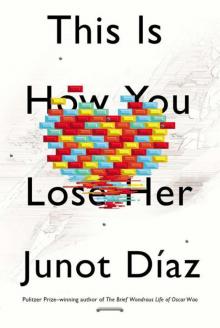 This Is How You Lose Her
This Is How You Lose Her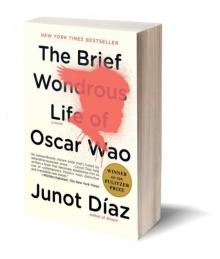 The Brief Wondrous Life of Oscar Wao
The Brief Wondrous Life of Oscar Wao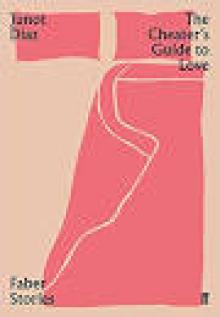 The Cheater's Guide to Love
The Cheater's Guide to Love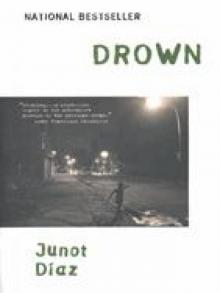 Drown
Drown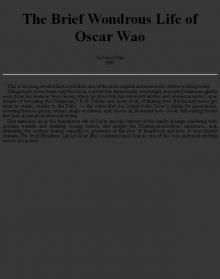 2007 - The Brief Wondrous Life of Oscar Wao
2007 - The Brief Wondrous Life of Oscar Wao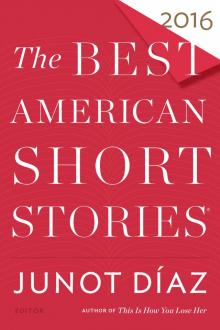 The Best American Short Stories 2016
The Best American Short Stories 2016